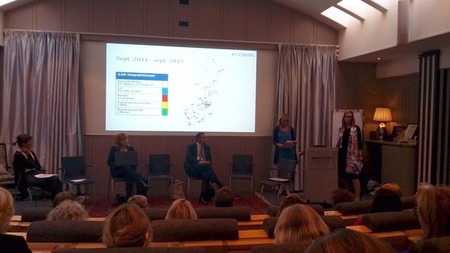The purpose of the seminar was to spread knowledge about the Optional Protocol to the Convention against Torture (OPCAT) and establish contact with representatives of both the Swedish authorities and civil society who work to prevent torture and inhuman treatment of persons who are deprived of their liberty.
European visiting bodies
Sweden’s member of the European Committee for the Prevention of Torture (CPT), Pelle Granström, gave a brief introduction to the committee and its work. Granström also pointed out several challenges that CPT and others engaged in torture prevention will face in future:
- To uncover torture and inhuman treatment in care of the elderly
- Privatisation of public services, such as treatment of drug addicts and alcoholics
- Refugees, immigration detention facilities and monitoring of forced returns
- Crowd control, i.e. use of force in connection with demonstrations
- Overcrowding, and overcrowded prisons in particular. This is a big problem in Europe, if not in the Nordic countries.
- Technical developments in relation to the execution of sentences, such as electronic monitoring.
Preventive work in Sweden
Representatives of the Swedish torture prevention body, the OPCAT unit, then gave a presentation about the unit’s methods, general findings and recommendations following visits, and future challenges in this work.
The OPCAT unit is organised under the Swedish Parliamentary Ombudsmen (JO), and has made 120 visits since 2011. About 70 per cent of the unit’s visits were announced. A report is written after each visit.
Generally, the OPCAT unit has found that the authorities provide inadequate information to detained persons. The possibilities for spending time outdoors in the fresh air and for activities are also poor during various forms of deprivation of liberty. In some areas, there is also little awareness of when, how and why coercive measures are used.
Women in focus in 2015
In addition to its visits, JO chooses a special focus area each year, and the 2015 focus area is women who are deprived of their liberty. A separate report will be prepared on this topic.
Cooperation with civil society
The seminar concluded with representatives from the Red Cross and Civil Rights Defenders in Sweden being interviewed about their work in the field.
Groups at risk, for example detainees and refugees, often have a great deal of confidence in non-governmental organisations. This means that the organisations enjoy good contact with them and have access to a lot of information. This makes them important partners both for the state and for other parties, such as JO.
JO has not established a separate advisory committee for the OPCAT work like the Norwegian Parliamentary Ombudsman has.
